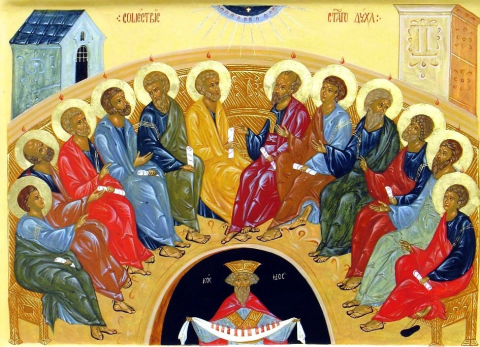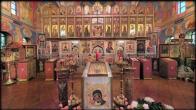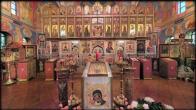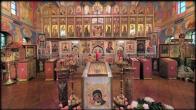You are here
PENTECOST. The Feast of the Holy Trinity

On the Feast of Holy Pentecost, the Holy Church commemorates and glorifies the descent of the Holy Spirit upon the Apostles in the form of tongues of fire. The name “Pentecost” refers to the fact that this event took place on the 50th day after the Christ’s salvific Resurrection. The Feast of Pentecost was also celebrated by the Old Testament Church, but that celebration was in commemoration of the fact that the Hebrews were handed down the Law [the Ten Commandments] on Mt. Sinai, fifty days after their exodus from Egypt. Among the Jews, Pentecost was one of the three Great Feasts. On that solemn and joyous Feast, they gathered together in great numbers in Jerusalem to offer the thanksgiving sacrifice to God as called for in the Law. This was considered mandatory even for Jews who lived in other countries.
In contemporary church usage, the Feast is also known as the Day of the Holy Trinity: with the descent of the Holy Spirit upon the Apostles, the blessed action of the Third Hypostasis of the Holy Trinity was made manifest, and the fullness of our Lord Jesus Christ’s teaching about the participation of Three Divine Persons in the implementation of the plan of mankind’s salvation became absolutely clear.
At the third hour (by our reckoning, 9:00 AM), in the Upper Room on Mt. Zion (Acts 1:13) – where the Apostles were in unceasing prayer after Christ’s Ascension – there suddenly came a noise from the heavens, filling the entire house and audible far beyond its walls. A multitude of tongues of fire appeared in the air, and for an instant came down upon the heads of the Apostles, illuminating, but not burning, them. Together with this outward manifestation, there followed an internal one, within the souls of the Apostles, filling all with the Holy Spirit. The Holy Spirit filled the souls of the Apostles for all time.
As the Holy Spirit is bodiless, It chose a sensory sign by which to more tangibly demonstrate its presence to the Apostles. “For...” St. Gregory the Theologian reasons, “...as the Son of God appeared visibly on earth, so it was appropriate for the Holy Spirit to appear visibly.” However, as St. Leo the Great teaches, “...let no one think that the very Divine Being of the Holy Spirit was in what was visible to physical eyes.” “As human sight cannot see the Father and the Son, so it cannot see the Holy Spirit.”
As soon as the Divine Fire had ignited within the souls of the Apostles, they raised up to the heavens words of praise and thanksgiving to God, Who is great in His benevolence toward mankind. And each of those who had received that blessing began to speak in some language which he theretofore had not known, languages of countries in which they had never been. That knowledge was a charism from the Holy Spirit, a gift that was essential for the Apostles to spread the Gospel Truth throughout the world.
Meanwhile, the sound from Heaven attracted many Jews to the Upper Room on Zion. They were amazed by the unexpected phenomenon: disciples of Christ, uneducated Galileans, suddenly speaking in foreign tongues. And no matter how varied in language and ethnic origin the makeup of the crowd, each person could hear someone preaching and praising God in his native language. For many people their amazement turned to terror, but there were others, impious people who, mocking, asserted that the Apostles “...are full of new wine...”. Then the Holy Apostle Peter gave his first sermon, in which he recounted the glorious things that had happened that day, the fulfillment of ancient prophecies, the completion of the great work of salvation of the people that had been accomplished on earth by the Crucified and Resurrected Lord Jesus Christ. That first Christian sermon was simple and concise, but inasmuch as the Holy Spirit was directing St. Peter’s speech, his words penetrated into the hearts of his audience and overcame their stubbornness. After hearing him out, “...they were pricked in their heart, and said unto Peter and to the rest of the Apostles, ‘men and brethren, what shall we do?’” Peter answered, “Repent, and be baptized every one of you in the name of Jesus Christ for the remission of sins, and ye shall receive the gift of the Holy Spirit.” Afterwards, “...they that gladly received his word were baptized...” and there were added to the Church of Christ that day “...about three thousand souls...” (Acts 2:37-41). Thus, this event concluded with the triumph of the Holy Spirit over the unbelievers. Jesus Christ imparted the Holy Spirit to His disciples three times: imperceptibly, before His Passion (Matthew 10:20), more openly, by breathing on them after His Resurrection, (John 20:22), and now, sending It to them materially.
Actually, the descent of the Holy Spirit upon the Apostles is a manifestation of Its power within them, a revelation of Its particular presence in them. The Holy Spirit had also worked within mankind in the past. It was in the Patriarchs, in the Prophets, in every pure soul; not a single truly good work ever happened without It. However, the appearance of Its Power was of utmost importance to humanity. The Holy Spirit came in order to complete what had been begun by the Savior: to render the Apostles capable of preaching the Gospel to the entire world, to enable mankind to take possession of the Divine Gifts that were acquired for it through the Passion of the Son of God.
The Feast of the Holy Trinity was established by the Apostles. After the descent of the Holy Spirit upon them, they began to celebrate the Holy Spirit annually, and decreed that all Christians should commemorate the event (I Corinthians 16:8, Acts 20:16). The Holy Church offers up communal praise of the Most-holy Trinity, and instructs us to hymn “the Unoriginate Father and Co-unoriginate Son, and the Most-holy Spirit, Co-everlasting,” – “The Trinity, One in Essence, One in Power, and Unoriginate.”
In the 4th Century, St. Basil the Great composed the kneeling prayers that to this day are read at the Festal Vespers service. The Church directs that Vespers be served immediately after the Liturgy so as to better maintain within the faithful a reverent attitude, enable them to follow the Apostles’ example and perform the kneeling and prayers in honor of the Holy Spirit in a most chaste manner, and worthily receive the priceless gifts of God’s grace.
From days of yore, the Holy Pentecost has been considered the birthday of the Church of Christ the Savior, established not by vain human interpretations and sophistry, but by God’s grace. It is customary to prepare churches and homes for the Feast of the Holy Trinity by decorating them with grass and branches. That is how it was in the Old Testament Church, and in all likelihood that was the way the Upper Room on Mt. Zion was decorated on that blessed day. Adoption of that custom may have been influenced by God’s appearance, in the guise of three strangers, to our ancestor Abraham at the Patriarch’s tent before the Oak of Mambre.
The Church of the New Testament made this custom its own, but with a new meaning: now fresh young greenery and flowers symbolize not only the offering up to God of the first blossoming of Spring, but also bringing the entire Church of Christ, which is hymned as blossoming like a flower; moreover, it is a token of the renewal of people by the Holy Spirit.
PARISH LIFE
RECENT VIDEOS
Address of our Cathedral
Subscribe to our mailing list
While all the materials on this site are copyrighted, you may use them freely as long as you treat them
with respect and provide attribution on the Russian Orthodox Cathedral of St.John the Baptist of Washington DC.









